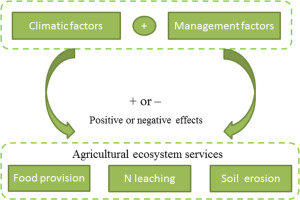当前位置:
X-MOL 学术
›
Sci. Total Environ.
›
论文详情
Our official English website, www.x-mol.net, welcomes your
feedback! (Note: you will need to create a separate account there.)
How do climatic and management factors affect agricultural ecosystem services? A case study in the agro-pastoral transitional zone of northern China
Science of the Total Environment ( IF 8.2 ) Pub Date : 2017-09-14 , DOI: 10.1016/j.scitotenv.2017.08.264 Jianmin Qiao , Deyong Yu , Jianguo Wu
Science of the Total Environment ( IF 8.2 ) Pub Date : 2017-09-14 , DOI: 10.1016/j.scitotenv.2017.08.264 Jianmin Qiao , Deyong Yu , Jianguo Wu

|
Agricultural ecosystem management needs to ensure food production and minimize soil erosion and nitrogen (N) leaching under climate change and increasingly intensive human activity. Thus, the mechanisms through which climatic and management factors affect crop production, soil erosion, and N leaching must be understood in order to ensure food security and sustainable agricultural development. In this study, we adopted the GIS-based Environmental Policy Integrated Climate (EPIC) model to simulate crop production, soil erosion, and N leaching, and used a partial least squares regression model to evaluate the contributions of climate variables (solar radiation, precipitation, wind speed, relative humidity, and maximum and minimum temperature) and management factors (irrigation, fertilization, and crop cultivation area) on agricultural ecosystem services (AES) in the agro-pastoral transitional zone (APTZ) of northern China. The results indicated that crop production and N leaching markedly increased, whereas soil erosion declined from 1980 to 2010 in the APTZ. Management factors had larger effects on the AES than climate change. Among the climatic variables, daily minimum temperature was the most important contributor to the variations in ecosystem services of wheat, maize, and rice. Spatial changes in the cultivated area most affected crop production, soil erosion, and N leaching for majority of the cultivated areas of the three crops, except for the wheat-cultivated area, where the dominant factor for N leaching was fertilization. Although a tradeoff existed between crop production and negative environmental effects, compromises were possible. These findings provide new insights into the effects of climatic and management factors on AES, and have practical implications for improving crop production while minimizing negative environmental impacts.
更新日期:2017-09-15











































 京公网安备 11010802027423号
京公网安备 11010802027423号